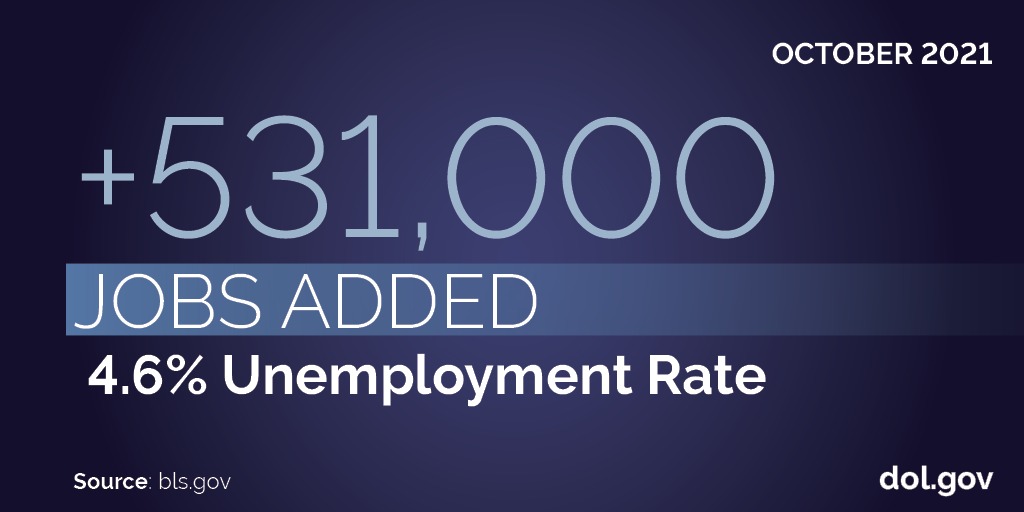
Employment rates are on the rise, and America’s workforce is finding jobs. The Bureau of Labor Statistics’ latest jobs report showed 531,000 new jobs in October, and the unemployment rate dropped to 4.6%. Here are five numbers to help you make sense of the October jobs report.
81%
We’ve recovered 18.2 million jobs, or 81% of the 22.4 million jobs lost in March and April 2020. We won’t have a full economic recovery until we recover from the pandemic – but this shows that we’re on the right track, and the Biden-Harris administration’s policies are moving the economy in the right direction. More than 62% of eligible workers in the U.S. have already received at least one COVID-19 shot, and OSHA’s new Emergency Temporary Standard will help build on that progress. Visit vaccines.gov for more info on vaccines and booster shots, or to schedule an appointment.
+235,000
Every month, when the Bureau of Labor Statistics releases the latest jobs data, they also revise the data from the most recent two months. Those revisions take into account new information that wasn’t available at the time of the initial release. The latest report showed that job growth in August and September was even higher than initially reported. August jobs were revised up from +366,000 to +483,000, and September from +194,000 to +312,000. In short, the economy added 235,000 more jobs in August and September than initially reported.
57.3%
Women were hit especially hard in the pandemic – both because of the sectors in which they are more likely to work, and because they’re more likely to take on critical but unpaid care work at home. In October, 57.3% of job gains went to women, but they still hold 2.4 million fewer jobs than in February 2020. Nearly 1 million (916,000) women age 25-54 have left the labor force since February 2020, accounting for 68% of the total decline.
61.6%
The unemployment rate dropped, but the labor force participation rate is holding steady. October’s rate (61.6%) was around the same as what we’ve seen in the last year. We want to see it go up to its pre-pandemic level of approximately 63%. That means bringing people back off the sidelines. Two things keeping people out of work are the pandemic and the lack of affordable care – which is why the Build Back Better agenda is investing on solutions that will improve public health, support working families, and get people back to work.
7.9%
Here’s another number that’s been stuck too long in the same place. The unemployment rate for Black Americans stayed at 7.9% this month, higher than for Hispanic (5.9%), Asian (4.2%) or white (4.0%) workers. Black workers are also disproportionately represented among those who have been out of work for a year or more. While Black workers account for only 13% of the labor force, they make up 20% of the long-term unemployed.
The coronavirus continues to influence job markets all over the world, but vaccinations and new treatments are improving public health, lowering transmission rates and raising confidence. Smart economic policy is helping too. Before the American Rescue Plan, the Congressional Budget Office was estimating that we’d need another two years to reach 4.6% unemployment – but the Biden-Harris administration’s policies are getting us back on track a lot faster than that.
There’s more work to do to ensure an equitable recovery for all workers, but October’s data shows us we’re moving in the right direction.
Janelle Jones is the chief economist of the U.S. Department of Labor.

 U.S. Department of Labor Blog
U.S. Department of Labor Blog